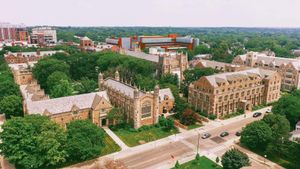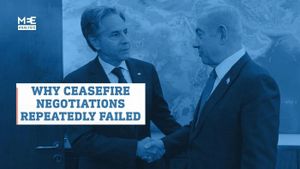Former Federal Reserve adviser John Harold Rogers, 63, of Vienna, Virginia, has been indicted on charges of economic espionage and making false statements. The U.S. Department of Justice alleges he exploited his position to illegally share sensitive economic intelligence with Chinese officials, which could potentially tilt the financial markets unfairly in favor of China.
According to the U.S. Attorney's Office for the District of Columbia, during his tenure as Senior Adviser at the Federal Reserve from 2010 until 2021, Rogers had access to confidential economic data and analysis. "This indictment sends a clear message... those who deliberately misuse sensitive Federal Reserve information for their own personal gain and lie about it to investigators will be held accountable for their actions," emphasized U.S. Attorney Edward R. Martin Jr.
The indictment outlines serious accusations against Rogers, including allegations of passing confidential financial data to Chinese intelligence officers, who had posed as graduate students to gain access to him. This breach of trust is particularly alarming as it could allow adversaries to manipulate the U.S. economy akin to insider trading. "The defendant leveraged his position within the Federal Reserve to pass sensitive financial information to the Chinese government, a designated foreign adversary...," stated Martin, highlighting the severity of the situation.
This scandal raises significant national security concerns. Devin DeBacker, head of the Department of Justice's National Security Division, remarked, "The Justice Department will continue to use all the tools at its disposal to disrupt economic espionage and protect our national security." With China holding approximately $816 billion of U.S. foreign debt as of October 2024, the stakes are high. The shared information could provide the Chinese government with strategic advantages, especially against changes to U.S. federal monetary policy.
Investigators reveal Rogers was not merely careless with his employer's secrets but actively sought to exploit his position for personal gains. Allegedly, from 2018 onward, he solicited trade secrets pertaining to proprietary economic datasets and Federal Open Market Committee (FOMC) discussions, which he would then forward to his personal email account or print out before traveling to China.
The Federal Bureau of Investigation (FBI) and the Federal Reserve’s Office of Inspector General (FRB-OIG) have been closely monitoring Rogers's activities. The detailed indictment claims he met with his co-conspirators under disguise as he posed as an academic instructor, thereby facilitating the transfer of sensitive information during covert meetings. "Rogers betrayed his country... by providing restricted U.S. financial and economic information to Chinese government intelligence officers," Assistant Director Kevin Vorndran of the FBI Counterintelligence Division stated.
Rogers's ties to China deepened when, reportedly, he received around $450,000 as part-time professor compensation from a Chinese university. This lucrative role raises questions about the motives behind his espionage. The Justice Department expressed serious concerns about this kind of economic treachery. "The Chinese Communist Party has expanded its economic espionage campaign... to become the sole superpower," commented David Sundberg, Assistant Director of the FBI Washington Field Office.
Legal repercussions for Rogers are dire. He faces up to 15 years on the espionage charge alone, alongside five additional years for the false statements made during the investigation. Despite these charges, his attorney, Jonathan Gitlen, states, "Dr. Rogers denies the allegations as set forth in the indictment." He is set to appear again before the court for arraignment.
Experts assert the importance of bringing such cases to the forefront. The indictment against Rogers not only exemplifies the risks posed by former government officials misusing their access to information but also serves as a clarion call to reinforce the mechanisms preventing economic espionage.
Moving forward, the U.S. government vows to remain vigilant against breaches of trust by officials who exploit their positions. "Let this indictment serve as a warning to all who seek to betray or exploit the United States... law enforcement will find you and hold you accountable," insisted Martin, reflecting the intensity of the commitment against economic espionage.
The case will continue to evolve as more details come to light during proceedings, and the broader repercussions on U.S.-China economic relations remain to be seen.



